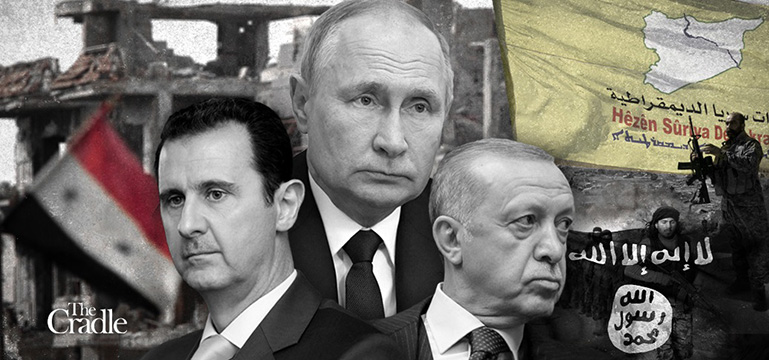
The newly-initiated Syrian-Turkish rapprochement talks are headed in Damascus’ favor and the “Turkish concessions” derided by opponents are just the start, insiders tell ‘The Cradle.’
Turkish President Recep Tayyip Erdogan has already abandoned his dream of “praying in the Umayyad Mosque” in Damascus. But sources say this will be swiftly followed by further concessions that will throw a wrench into the ambitions of Syria’s opposition factions.
There will be no “federalism” or “confederation” – western codewords for the break up of the Syrian state – at these talks, but rather a “Turkish-Russian” acceptance of Damascus’ conditions.
The Syrian-Turkish talks in Moscow on 28 December 2022 focused mainly on opening and establishing the necessary political, security, and diplomatic channels – a process initiated by their respective defense ministers.
While resolving the myriad thorny files between the two states is not as easy as the optimists would like, it is also nowhere as difficult as the fierce opponents of rapprochement try to suggest.
The Moscow discussions centered on mild, incremental solutions proposed by Russia. The Kremlin understands that the minefield between Ankara and Damascus needs to be dismantled with cold minds and hands, but insists that the starting point of talks is based on the political formulas of the Astana peace process that all parties have already accepted.
On the ground, Moscow is busy marketing satisfactory security settlements for all, though those on the battlefield appear to be the least flexible so far. The Russian plan is to “present security formulas to the military,” intended to be later translated into the integration of forces – whether Kurdish fighters or opposition militants – into the ranks of the Syrian Arab Army (SAA).
This will be achieved via committees led by both Syrian and Turkish intelligence services, a Russian source involved in coordinating the talks tells ‘The Cradle’.
For starters, Ankara plans to open the strategic M4 highway – which runs parallel to the Turkish border and connects all the vital Syrian cities and regions – as a prelude to opening the legal border crossings between Syria and Turkiye, which will re-establish trade routes between the two countries.
This move, based on an understanding between Damascus and Ankara, will essentially close the door on any opposition fantasies of breaking Syria into statelets, and will undermine the “Kurdish-American divisive ambition.”
It is not for nothing that Washington has sought to thwart communications between Ankara and Damascus. Under the guise of “fighting ISIS,” the US invested heavily in Syrian separatism, replacing the terror group with “Kurdish local forces” and reaped the rewards in barrels of stolen Syrian oil to help mitigate the global energy crisis.
Turkiye’s abandonment of its “demand to overthrow the regime” applies also to its affiliated military factions inside Syria, as the latter’s goals have dwindled to preserving some areas of influence in the north of the country. This is the current flavor of Turkiye’s reduced “confederation” ambitions: To maintain Turkish-backed factions within “local administrations” in northern areas where Turkiye has influence. This, in return for giving up on Ankara’s political ambition of “regime change” in Damascus and redrawing Syria’s northern map.
From the Syrian perspective, officials are focused on eliminating all opposing separatist or terrorist elements who do not have the ability to adapt to a “unified” Syrian society.
Therefore, Damascus rejects military reconciliation proposals for any “sectarian” separatist or factional militias. Syrian officials reiterate that “the unity of the lands and the people” is the only gateway to a solution, away from the foreign interests that promote “terrorism or secession” – a reference to the Turkish and American role in Syria’s war.
In short, the Russian mediation to bring Damascus and Ankara closer is moving slowly, but according to the Turkish source, “it is closer to reconciliation because the Syrian Ministry of Local Administration is beginning to take charge of regional affairs after holding new local council elections – in compliance with plans forged in the Astana process.”
Regarding Astana, the Turkish source says, “Let the Syrians treat the Kurdish and opposition areas as one, if the Kurds agree to dismantle their factions and join the Syrian army within a certain equation, the opposition factions will also accept.”
Regarding the complicated geopolitics of Syria’s east – currently occupied by US troops and their proxies – a high-ranking Syrian official who recently visited Saudi Arabia and Cairo, proposed “Arab intervention with the Syrian tribes to disengage tribe members in the Al-Tanf region from the US forces.” But according to the official, this would be subject to “the progress of relations between Damascus, Riyadh, Cairo, and possibly even Jordan.”
read more in our Telegram-channel https://t.me/The_International_Affairs

 12:06 17.01.2023 •
12:06 17.01.2023 •






















